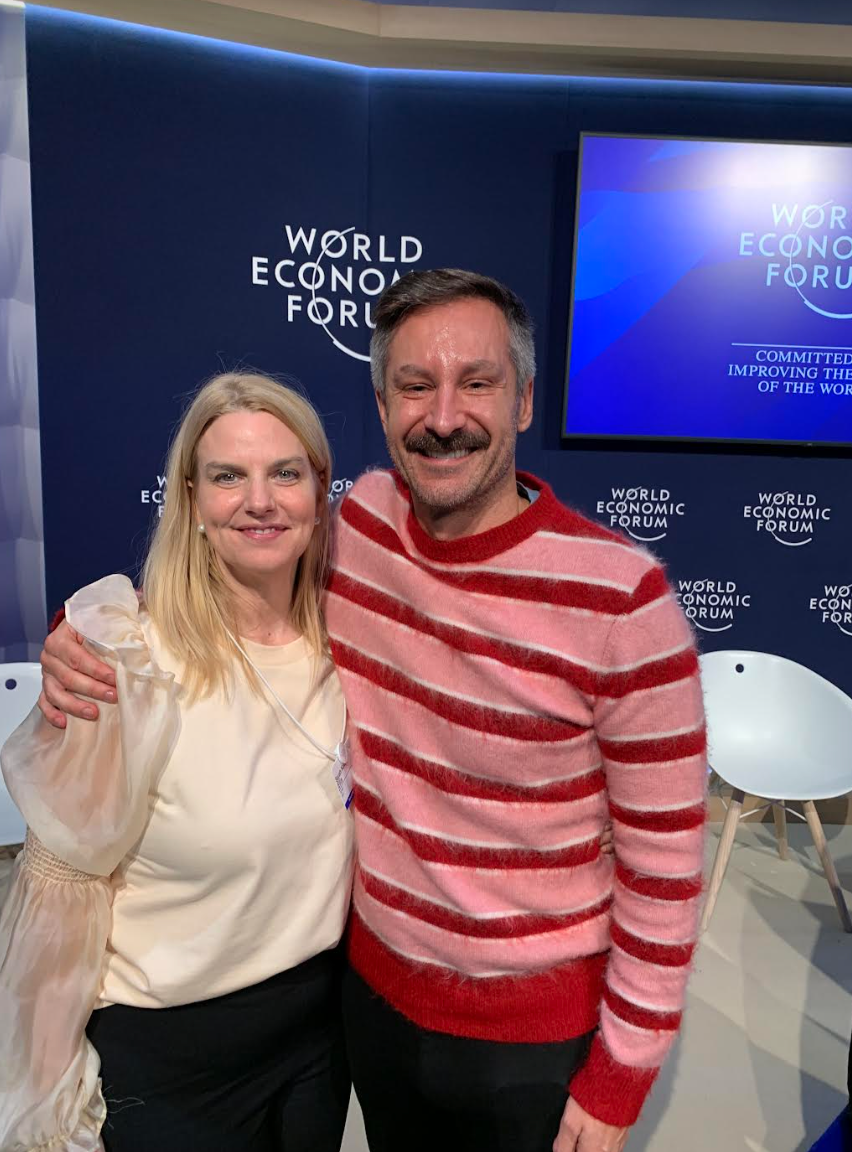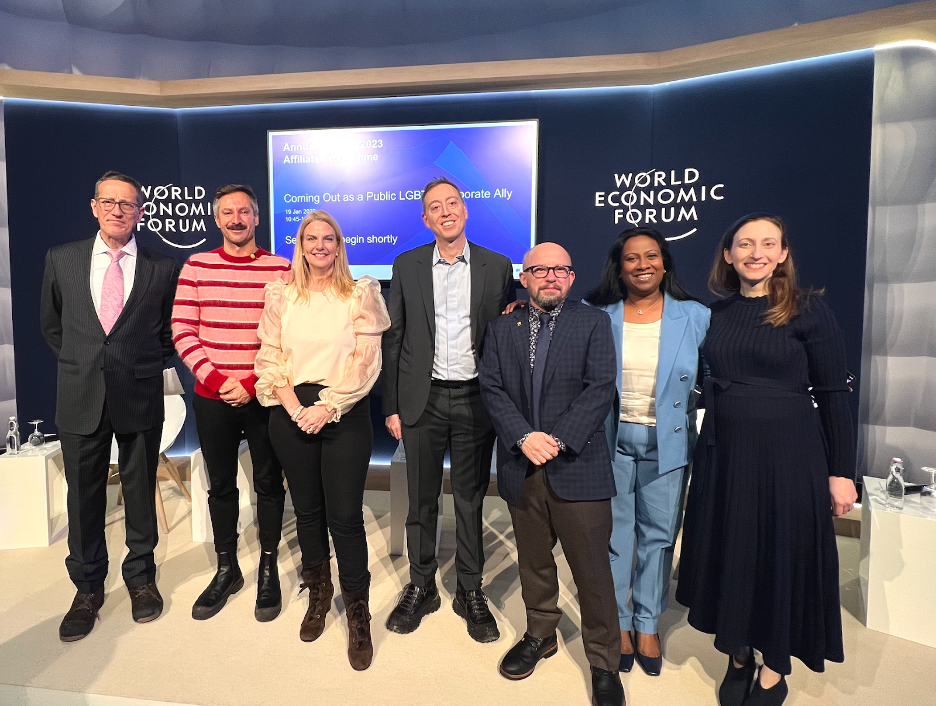Each year, business and political leaders from around the world gather in Davos, Switzerland, to attend The World Economic Forum Annual Meeting. This year, a WEF affiliate session on the topic of “Coming Out as a Public LGBTQ Corporate Ally” was organized by Accenture, GLAAD, Open for Business, and the Partnership for Global LGBTQI Equality.
CNN’s Richard Quest opened the discussion by describing what it means to be a corporate ally to LGBTQ people. “I looked up the definition of allies. Supporters, friends, those who are with you,” Quest began. “We have to push it further than just friends. It’s not enough… A pride flag once a year is not enough.”

Quest then introduced GLAAD President & CEO Sarah Kate Ellis to the stage by describing her as the “person who will lead this cause to the next level and beyond.” Ellis opened her presentation with a discussion of “Pride on the Promenade,” a historic rainbow light-up of the iconic Davos Promenade that occurred the evening before. In a demonstration of support for the global LGBTQ community, multiple venues and signs on the main street lit up in rainbow. More than fifteen companies participated in the initiative, which was organized by Accenture, GLAAD and PGLE to honor the progress of LGBTQ human rights and serve as a call to action for necessary advances in global LGBTQ acceptance and equality.
Ellis then presented on why corporate allyship is important and necessary all year long. She displayed a collection of news headlines from the past year illustrating the threats, violence, and animus the LGBTQ community is facing in the US, including the Club Q shooting in Colorado, statistics about LGBTQ youth suicide, anti-LGBTQ legislation in the United States, and the rise in hate around the world. “These headlines show how political leaders and right-wing activists are playing politics with our lives and it’s leading to violence,” Ellis explained. “Our community is unsafe in America, and worldwide. We need advocates and safe havens.”

With growing threats to LGBTQ people in the U.S. and abroad, Ellis called on global business to take action and also shared a business incentive: The 2022 Edelman Trust Barometer Key Insights: Business and LGBTQ Rights in the U.S., released in partnership with GLAAD, found the majority of Americans support companies and CEOs who speak out on behalf of LGBTQ rights.
The study found that:
- If a brand publicly supports and demonstrates a commitment to expanding and protecting LGBTQ+ rights, Americans are 2x more likely to buy or use the brand
- 59% of Americans say that if business devoted significant resources to protecting the rights of the LGBTQ+ community, it could have a positive impact
- U.S. employees say they are 4.5x more likely to work at a company if it publicly supports and demonstrates a commitment to expanding and protecting LGBTQ+ rights
Ellis gave a strong call to action for companies to act: “Consumers believe your role in global business is to inform conversation, and to expand and protect our rights. Public advocacy builds loyalty everywhere. They want to work for and buy from brands that support us. The challenge has been given to you. What will you do?”
Politico’s Ryan Heath then took the stage to moderate a panel discussion. He introduced the speakers including Kavitha Prabhakar, the Chief Diversity, Equity, Inclusion Officer at Deloitte, Jay Brown, the SVP of Programs, Research & Training at Human Rights Campaign, Nadjia Yousif, the Chief Diversity Officer, Managing Director & Partner at Boston Consulting Group, and Justin Blake, a Member of GLAAD’s Board of Directors.
“There are a lot of ways you can be an ally to us that isn’t just sending out a tweet,” Justin Blake explained. “Someone like me could be killed in too many countries right now. When you’re doing operations in those places, use quiet diplomacy…There are lots of things that you can do in the background that would be so helpful in your allyship.”
Jay Brown spoke next about the Human Rights Campaign’s Corporate Equality Index. He talked about the organization’s work with corporate America and protecting the rights of queer and trans people in the workplace: “We are making sure they are advocating for their workers in the public sphere. They have these benefits but what good are these benefits if the governor of their state is then going to deny them that care?”
Nadjia Yousif addressed Gen-Z’s role: “They want and they demand their organizations to not just say that they have an opinion on LGBTQ topics, but also do something about it.” She went on to explain that, “There are many ways that an organization can play to their core strengths and leverage their business.” Yousif also pointed to examples of how BCG works with organizations like Give Out and PGLE “to involve staff in making change happen.”
Kavitha Prabhakar had advice for corporate leaders: “We have to get comfortable with reporting on what is the LGBTQIA makeup of these teams. That progress is important because representation matters in all places where decisions are made.” She later spoke about the importance of equity in business design and its effect on sustainability. She explained that the focus on equity “has to become part of who you are.”
All of the panelists including GLAAD are members of PGLE, which was a co-organizer of the event. Launched during the World Economic Forum’s Annual Meeting in 2019, the Partnership for Global LGBTIQ+ Equality (PGLE) is a coalition of organizations committed to leveraging their individual and collective advocacy to accelerate LGBTIQ+ equality and inclusion globally and drive positive change, through raising awareness and advancing implementation of the UN Standards of Conduct for Business on Tackling Discrimination against LGBTI people. PGLE is a coalition of organizations committed to leveraging their individual and collective advocacy to accelerate LGBTIQ+ equality and inclusion globally and drive positive change.
PGLE is an initiative of BSR, UN Office of the High Commissioner for Human Rights, and the World Economic Forum, and is comprised of the following companies and civil society organizations:
Companies: Accenture, BCG, Cisco, The Coca-Cola Company, Credit Suisse, Deloitte, Deutsche Bank, Edelman, EY, Johnson & Johnson, Kerry, Mastercard, McKinsey, Medtronic, Microsoft, Nestle, Novartis, P&G, PepsiCo, PWC, Randstad, Salesforce, Scotiabank, WPP
Civil Society: GLAAD, Human Rights Campaign, Human Rights Watch, ILGA World, Outright International, Stonewall













